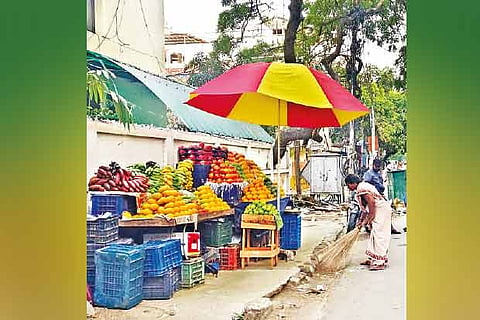

Chennai
A Chennai Corporation official while noting that zone level town vending committees have been formed and the meetings were held, said “A resolution has been passed and the special council meeting has approved the by-laws. Vendors and public can send their objections and suggestions within 30 days from the date of notification, that is December 31.”
As per the new by-laws, town vending committees of respective zones would decide on the number of street vendors to be permitted on roads keeping the vehicle and pedestrian movements in mind. Street vending would be banned on the streets that are 3 to 5 metres wide and vending might be allowed on one side of the roads having a width of 5 to 6 metres. On the roads that are 10 metres wide, vending would be allowed on both sides. Street vending would not be allowed in ASI notified places.
The by-laws also banned street vending within 10 metres from the entrances of government and Chennai Corporation offices and 50 metres from the entries and exit of railway stations and bus stands. 30 metres from the gates of educational institutions would become no vending zones.
The Greater Chennai Corporation has fixed annual charges based on the width of the roads and the guideline value.
“To set up stationary roadside shops having more than 25 sqft, the vendors should pay an annual charge of three per cent from the guideline value but not less than Rs. 3,500. Charges have also been fixed for push carts. The charges will be revised once every three years. Street vendors should also pay monthly maintenance charges,” the official said.
If the street vendors fail to follow the conditions laid in the vending licence, they would have to pay the penalty which is three times higher than the monthly maintenance charges. “Power, water and sewage connections will not be provided to the street vendors and they should use rechargeable lamps and generators,” the official added.
Banned areas
Visit news.dtnext.in to explore our interactive epaper!
Download the DT Next app for more exciting features!
Click here for iOS
Click here for Android